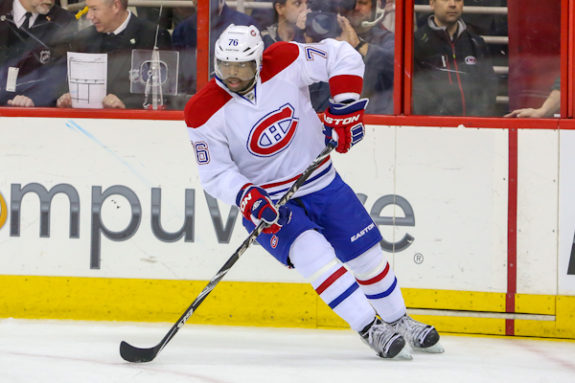Montreal Canadiens general manager (GM) Kent Hughes has a long to-do list to check off this offseason. One of the top items must be to sign Cole Caufield to a new contract, and as a former player agent himself, Hughes understands the issues he faces on this front.
Related: Canadiens’ Salary Cap Issues Will Lead to Offseason Moves
Hughes and Caufield’s agent Pat Brisson have several historical examples of restricted free agent (RFA) deals as well as recent ones (Matt Boldy) that provide a roadmap to a long-term contract. With Hughes also having the added pressure that this deal, along with the Nick Suzuki contract, will form the basis of Montreal’s salary cap structure for the next decade, something Toronto Maple Leafs fans know has a big impact on team success even with high priced talent signed long term. So, what will this deal look like? Will there be more bumps along the road before reaching an agreement on a long-term extension?
Caufield’s Extension
For Caufield, this extension provides him an opportunity to choose to bet on himself, in that he signs a bridge contract in the hopes he continues to score at an incredible pace, perhaps even increasing it and adding a 50-goal season before the next negotiation. Former Canadiens star PK Subban did something similar and it led to him signing a long-term deal paying him $9 million per season. Or Caufield could choose to sign his long-term deal right away, ensuring stability in case of injuries but also providing him with a large payday, albeit one that may be slightly less than one if all things go right for him. Essentially, this could be the richest contract he gets to sign in his NHL career.

What could put fans’ minds at ease is the comments team owner Geoff Molson made at the beginning of May when he stated that the extension could happen at any moment. When asked about the negotiations, Molson said that was more of a question for executive vice president Jeff Gorton and Hughes, stating that “It can happen any time. I won’t tell you to stay close to your phone today, but you never know when it’s going to happen”.
While that level of confidence could allay fears of a future offer sheet, the fact that was several weeks ago, it no longer does. But, there hasn’t been any sort of disputes or friction overheard, real or imagined, between the team and Caufield either, which only points to the contract talks being slow due to finer details needing to be addressed.
Fear of the Offer Sheet
Even though goal-scoring has been on the rise over the last few seasons, goals still come at a premium in the NHL. Because of that, every team continues to look for ways to improve their offence. Because of that, it wouldn’t be a surprise if most NHL teams are not at least discussing a possible offer sheet to Caufield. That is especially true of the final team to pass him over at the 2019 Draft, the Philadelphia Flyers, whose fan blogs and media have made mention of this being a real possibility.
As a team may decide to submit an offer sheet, it’s good to remember what the compensation categories are:
$6,435,187 to $8,580,250: first, second, and third-round picks
$8,580,251 to $10,725,314: two first-round picks, second and third-round picks
Over $10,725,314: four first-round picks.
Even if there is an offer sheet made to Caufield, it’s important to remember that the player must actually sign it before it becomes a reality. Canadiens fans may feel more than a little jaded due to the Jesperi Kotkaniemi saga, which came to be because of a situation that turned sour. But there has been no indication of anything that points to Caufield wanting anything other than staying in Montreal, a market that so far has worshipped the young star and has showered him with praise. Hughes and Caufield are more likely than not (99.9% certainty) to get a deal done before the start of the 2023-24 training camp and reunite him on Nick Suzuki’s wing.
Value of Caufield’s Next Contract?
After only two NHL seasons, Caufield has shown he can be a reliable scoring threat, something the Canadiens haven’t had in several years. In two seasons on the roster, he has managed to score 12 points in 20 playoff games, while on a top line for a team that made the Stanely Cup Final in 2021. In the regular season, he has 53 goals and 84 points in 128 games played, good for 0.64 points per game (PPG). This does include 30 games without a goal under former head coach Dominque Ducharme. Under current head coach Martin St. Louis, Caufield has scored 48 goals in 83 games, showing just how impactful it was for the young scoring phenom to be tutored by his childhood hockey hero. Over their short tenure together, Caufield has evolved into one of the better five-on-five scoring threats, not just on the Canadiens, but in the NHL as a whole.

All of that is impressive and should mean a big paycheck, but defensive hockey is a requirement as well. Since his arrival, this aspect of his game has evolved. While at 5-foot-7 and 174 pounds he will never be a dominant one-on-one defender, he also doesn’t need to be. He has shown himself capable of playing positionally sound, using his stick to help strip pucks and cut off lanes, but more importantly, reacting quickly in a turnover situation. He transitions the puck well through the neutral zone, with speed. He is adept at entering the offensive zone with control and can pressure defenses with speed on the forecheck, all to keep the play 200 feet from his net, which is the best defense a team has.
Comparables
The 2019 first overall pick, Jack Hughes, just completed the first season of his eight-year, US$64-million contract with an $8 million average annual value (AAV) salary-cap hit. In 244 regular-season games for the New Jersey Devils, he has 87 goals and 207 points scored, good for 0.84 PPG. Also, Hughes is the team’s number one center, which adds value to his contract as it is an important position.
Minnesota Wild winger (and 12th overall selection in 2019) Matthew Boldy could provide a better template for Caufield’s next deal. In 128 regular season games, the 6-foot-2, 201-pound winger scored 46 goals and 102 points, good for 0.79 PPG. This provided him with a seven-year deal worth $7 million AAV.
These two players are good to use as recent comparables for Caufield since they have had similar games played, similar impacts on their clubs, and they were all selected at the 2019 NHL Entry Draft. Of note, Hughes’ 87 goals make him the highest-scoring player of the 2019 Draft, followed only by Caufield (53). Kent Hughes has said he wants to keep Caufield with the Canadiens long-term but will also need to keep some cap flexibility and ensure their salary cap structure allows for him to add several more impact players to build around Caufield and Suzuki.
There are several other factors to consider, such as taxes, the exchange rates on the Canadian and American dollar, the pressures of the Montreal market, and dozens of other factors. The biggest may be his injury history, as his shoulder surgery this offseason, along with Caufield’s smaller stature, could be a concern for the Canadiens on a long-term deal. However, one that sits between Boldy’s $7 million and Hughes’ $8 million is the likeliest outcome on a seven or eight-year contract for Caufield.
